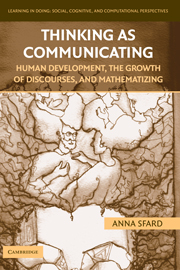Book contents
- Frontmatter
- Contents
- Series Foreword
- Introduction
- Acknowledgments
- Part I Discourse on Thinking
- Part II Mathematics as Discourse
- 5 Mathematics as a Form of Communication
- 6 Objects of Mathematical Discourse: What Mathematizing Is All About
- 7 Routines: How We Mathematize
- 8 Explorations, Deeds, and Rituals: What We Mathematize For
- 9 Looking Back and Ahead: Solving Old Quandaries and Facing New Ones
- Glossary of Commognition
- References
- Name Index
- Subject Index
- Titles in the series
8 - Explorations, Deeds, and Rituals: What We Mathematize For
Published online by Cambridge University Press: 27 July 2009
- Frontmatter
- Contents
- Series Foreword
- Introduction
- Acknowledgments
- Part I Discourse on Thinking
- Part II Mathematics as Discourse
- 5 Mathematics as a Form of Communication
- 6 Objects of Mathematical Discourse: What Mathematizing Is All About
- 7 Routines: How We Mathematize
- 8 Explorations, Deeds, and Rituals: What We Mathematize For
- 9 Looking Back and Ahead: Solving Old Quandaries and Facing New Ones
- Glossary of Commognition
- References
- Name Index
- Subject Index
- Titles in the series
Summary
It is so much a part of “thinking philosophically” to be impressed with the special character of mathematical truth that it is hard to shake off the grip of the Platonic Principle [according to which differences in certainty must correspond to differences in the objects known]. If, however, we think of “rational certainty” as a matter of victory in argument rather than of relation to an object known, we shall look toward our interlocutors rather than to our faculties for the explanation of the phenomenon. If we think of our certainty about the Pythagorean Theorem as our confidence, based on experience with arguments on such matters, that nobody will find an objection to the premises from which we infer it, then we shall not seek to explain it by the relation of reason to triangularity. Our certainty will be a matter of conversation between persons, rather than a matter of interaction with nonhuman reality.
Richard RortyThe word did not exist in the beginning. In the beginning was the deed. … The word is the end that crowns the deed.
Lev Semionovitch VygotskyRituals help us … to connect deeply with people. … The repetition that ritual always involves sets the present moment in a larger context and infuses it with wider meaning. It's difficult to invent rituals.
Huston SmithTo use Walter Fisher's expression, humans are “storytelling animals” and mathematizing is just one special type of storytelling activity.
- Type
- Chapter
- Information
- Thinking as CommunicatingHuman Development, the Growth of Discourses, and Mathematizing, pp. 222 - 260Publisher: Cambridge University PressPrint publication year: 2008

